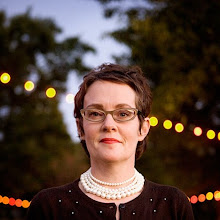
Washington University campus, St. Louis. photo courtesy the author.Funny how bullhorns are creeping into my speech these days.
Protestors in the Middle East demanding the creation of civil society.
Protestors in the mid-west trying to stop the dismantling of civil society.
This eerie stage on Wash U's campus looks very Soviet-era, despite the neo-Gothic building in the background.
The speakers on top of the pavilion reminded me of when I was part of a union negotiating team when I worked at the Museum of Modern Art. PASTA-MoMA was part of the white collar division of the United Auto Workers--open shop, of course (this means employees were not obliged to pay union dues but they benefited from the union's work on their behalf).
The lawyer for MoMA complained one morning that he had $1 million worth of damage to trees on his property in Connecticut. We were trying to raise the minimum wage for the front desk workers who made $13,000 a year and had to speak two languages (this was around 1987). It's as if we were on different planets.
I am all for free markets but I believe in the Social Contract that provides a safety net for people less fortunate--like the millions laid off because of the global financial collapse. The arts are part of that civil society / Social Contract that I pay to support--that lots of people pay to support. The arts frame the value of life, giving it texture and meaning.
If we are all not trying to make everyone's life better, then we're in one big open shop--where the majority does the hard work while a minority benefits.
All of our nationals arts foundations--from museums and libraries to public radio and television--are under attack. If you haven't already I urge you to express yourself--even if you disagree with me, take a stand.






